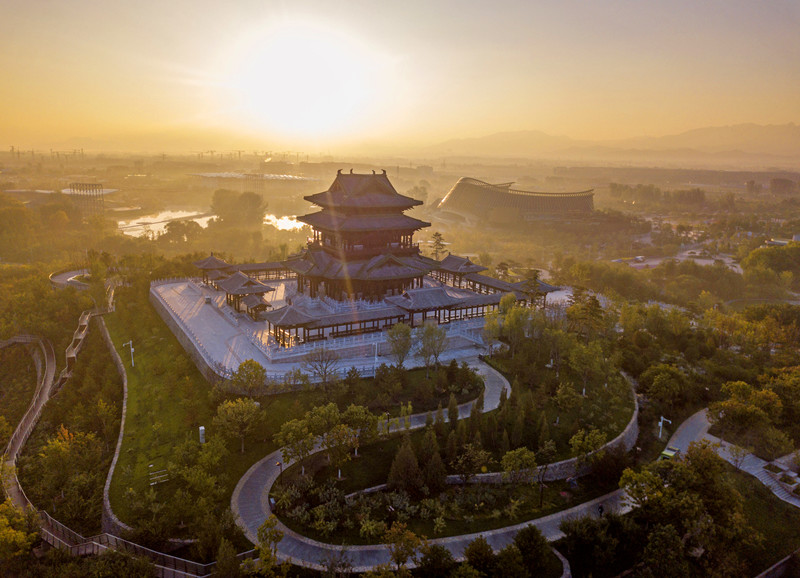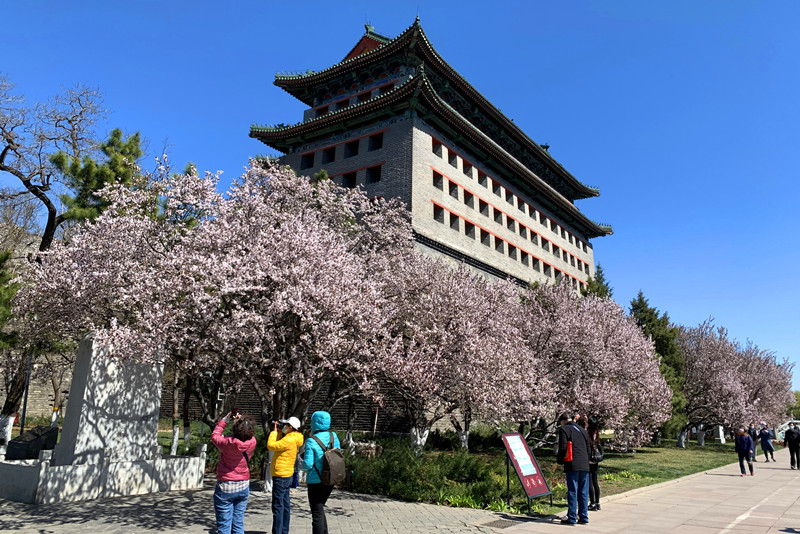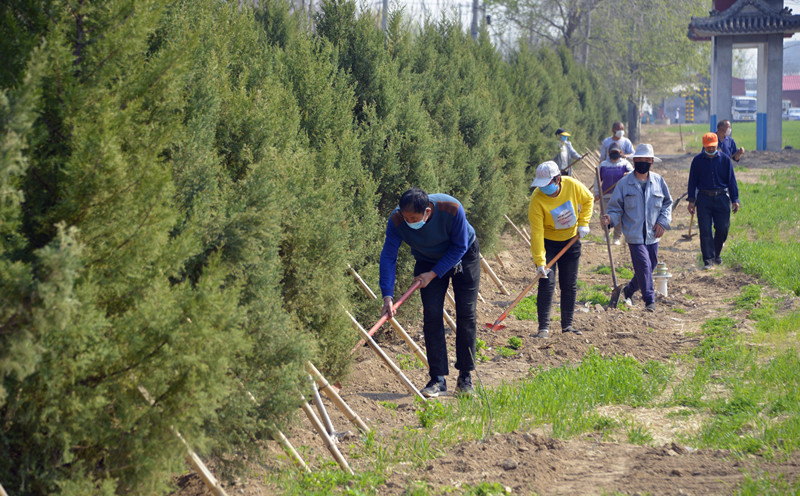Beijing revs up building "garden city" after horticultural expo
-Tuesday marks the one-year anniversary of the opening of the Beijing International Horticultural Exhibition, the world's largest horticultural expo, which has attracted more than 9 million visitors and exhibitors from over 110 countries and international organizations in 162 days.
-The experience and know-hows accumulated through holding the horticultural expo have been applied beyond the park to more areas, including the capital city of Beijing.
-Beijing, the city once at the edge of desertification, is much greener now. Its forest coverage has surged to 44 percent by the end of 2019 from about 1.3 percent in the 1950s.
by Xinhua writer Xuan Liqi
In the view of Gao Dawei, deputy director of Beijing Gardening and Greening Bureau, the 503-hectare park that hosted the Beijing International Horticultural Exhibition last year is a "big garden" at the foot of the Great Wall.
Tuesday marks the one-year anniversary of the opening of the exhibition, also known as Beijing Expo 2019, the world's largest horticultural expo that attracted more than 9 million visitors and exhibitors from over 110 countries and international organizations in 162 days.

Aerial photo taken on Oct. 7, 2019 shows the Yongning Pavilion at the International Horticultural Exhibition in Yanqing District of Beijing, capital of China. (Xinhua/Cai Yang)
Themed "Live Green, Live Better," the expo displayed around 8,000 gardening plants and 820 vegetable, fruit, and herb species. More than 3,200 cultural events showcasing the culture and ecology of participating countries were also held during the expo, including concerts, dances, operas and displays of intangible cultural heritages.
The concept of prioritizing ecological conservation has run through all aspects of the expo including planning, construction and operation. All venues at the exhibition were built based on the principles of cutting carbon emissions and protecting the environment.
"The exhibition has given people a lot of beautiful and eternal memories and has spread the concept of green development to every corner of the world, which I think are the biggest legacies of the event," said Zhang Lannian, chief engineer of the expo's coordination bureau.

Tourists visit the China Pavilion at the Beijing International Horticultural Exhibition in Yanqing District of Beijing, capital of China, May 23, 2019. (Xinhua/Li Xin)
The site of the expo in Beijing's northern suburban district of Yanqing will be turned into an education base of ecological culture, according to the bureau.
City as a big garden
The experience and know-hows accumulated through holding the horticultural expo have been applied beyond the park to more areas, including the capital city of Beijing.
"If the exhibition site of the expo is a big garden, the whole city of Beijing has become an even bigger one covering an area of more than 16,000 square km," said Gao, the gardening bureau chief.
Beijing, the city once at the edge of desertification, is much greener now. Its forest coverage has surged to 44 percent by the end of 2019 from about 1.3 percent in the 1950s. The city's green space per capita also increased to 16.4 square meters in 2019.

People view flowers at the Beijing Ming Dynasty (1368-1644) City Wall Relics Park in Beijing, capital of China, March 27, 2020. (Xinhua/Li Xin)
From 2012 to 2015, the city launched a large-scale afforestation project covering more than 66,000 hectares. It has also added over 33,000 hectares of wetlands in another ongoing project since 2018.
"The expo provides a stage for Beijing to showcase its practice of green development," said Gao. "The five-point initiative on promoting green development, including a scientific spirit in ecological governance and pursuing harmony between man and nature, has become the guidance and driving force for Beijing's high-quality development of gardening and greening efforts."
To make the city greener and more livable, the city demolished illegal buildings and built more pocket parks and green spaces.

Villagers work for an afforestation project in Daxing District of Beijing, capital of China, April 6, 2020. (Xinhua/Li Xin)
"We do not only pay a great deal of attention to large-scale greening projects but focus on greening efforts in alleys, run-down residential communities and other corners in the city to improve the environment for every citizen," said Gao.
In 2018, the city's Xicheng District removed illegal buildings in an alley in the district and built a park of 800 square meters.
"There used to be illegal buildings everywhere in the alley, which made us quite annoyed," said Li Jian, a resident at the alley. "Now the district's gardening department not only built a small park, but also offered us free potted plants for us to beautify the neighborhood."
Li and other residents organized a club with nearly 100 members to exchange their experience in growing the plants. "It is fun for us to exchange ideas on growing plants while enjoying the flowers and greenery together," Li said.
Thanks to the greening efforts, the city has seen more and more birds coming.

Birds are seen at the Beijing Wild Duck Lake Wetland in the suburban Yanqing District of Beijing, capital of China, April 5, 2020. (Xinhua/Chen Zhonghao)
"More migratory birds pass through the city each year as the ecological environment is improving," said Zhang Zhiming, director of the wildlife and wetland protection department of the Beijing Gardening and Greening Bureau, noting that more than 1.4 million migratory birds including over 1,000 swans were recorded in Beijing this spring.
The city's greening efforts also brought economic benefits. The afforestation project launched in 2018 created 86,000 jobs, and the city planted over 660 hectares of fruit trees and more than 4,600 hectares of flowers with an output value of 1.25 billion yuan (about 176.8 million U.S. dollars) in 2019.
Humans are a part of nature and should live in harmony with nature, says Xu Guang, president of China Environmental Protection Foundation. "Greening efforts should be passed on from generation to generation."
Reporting by Li Bin and Wei Mengjia and also contributing by Yang Na; video by Ma Xiaodong and editing by Wu Yao (Xinhua)